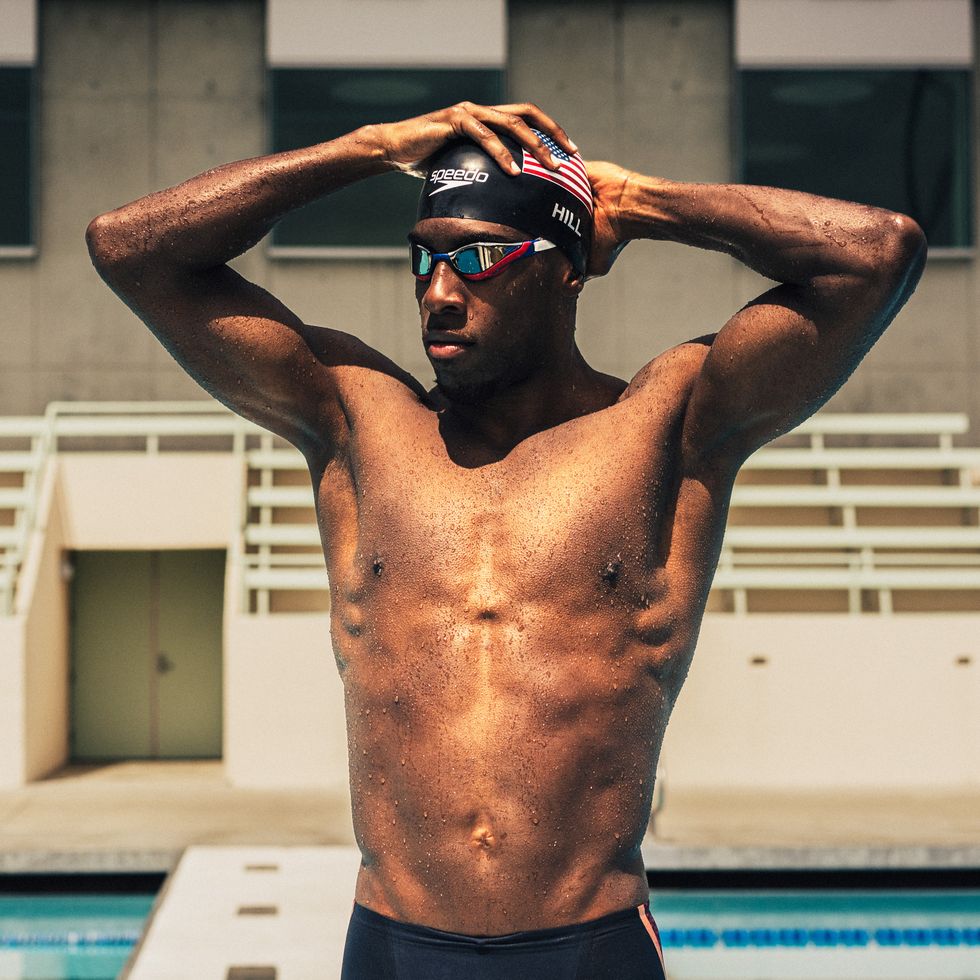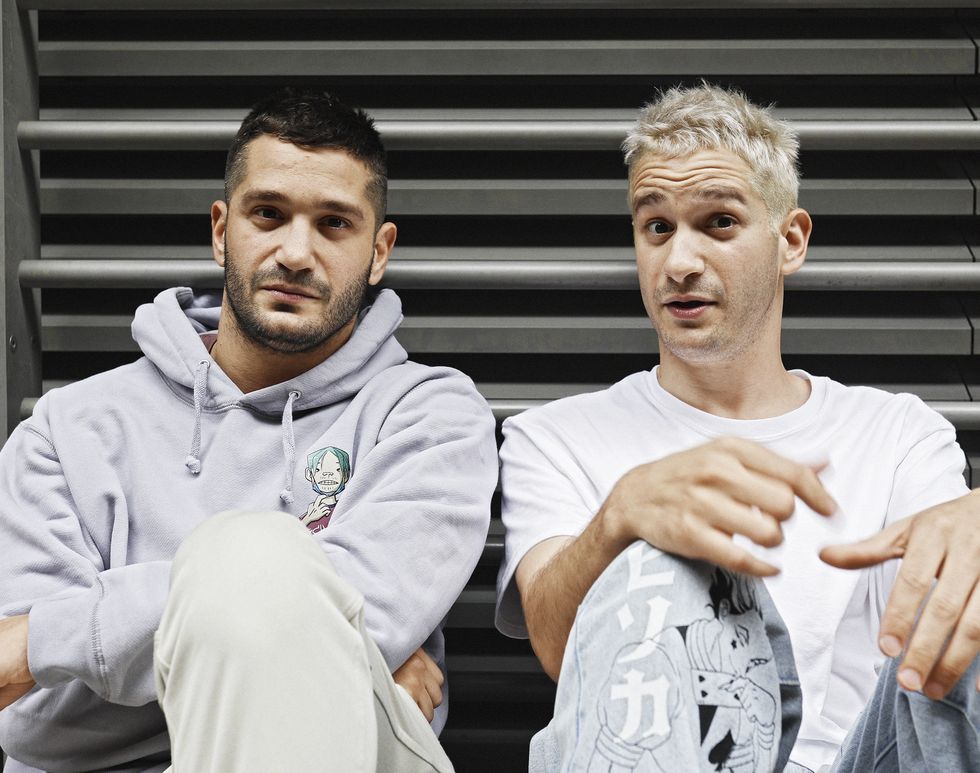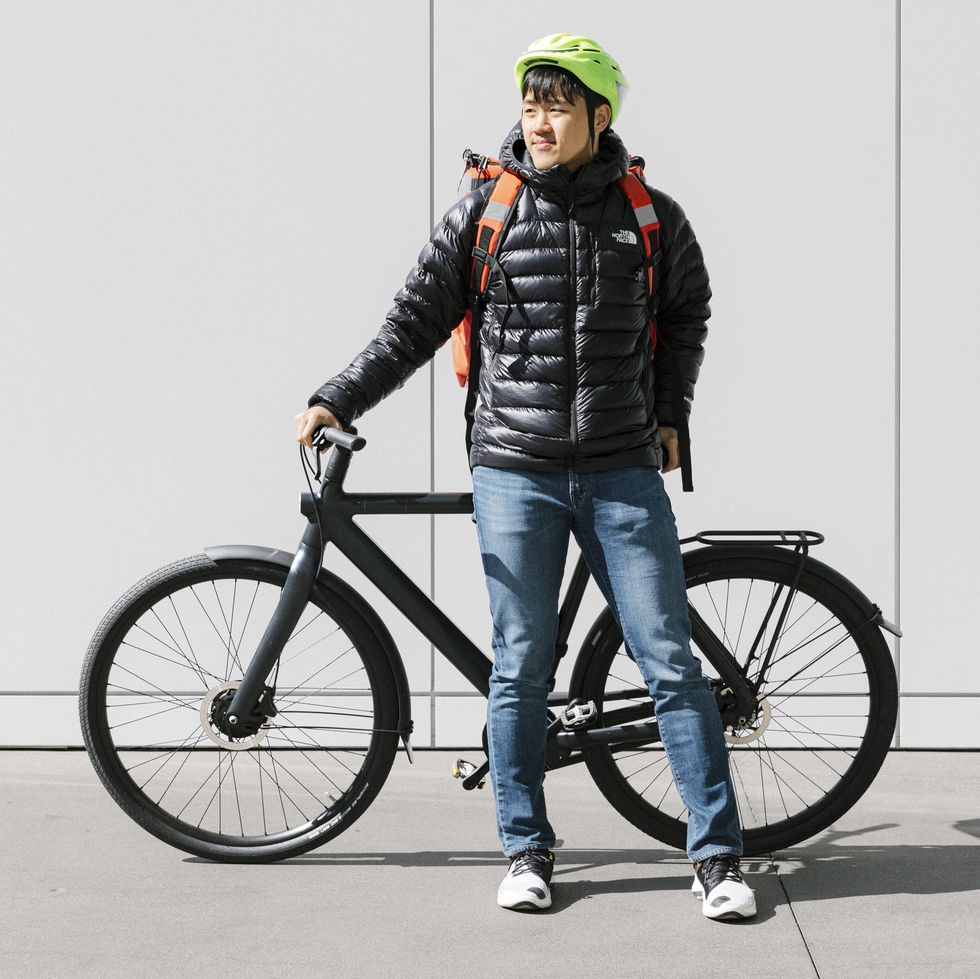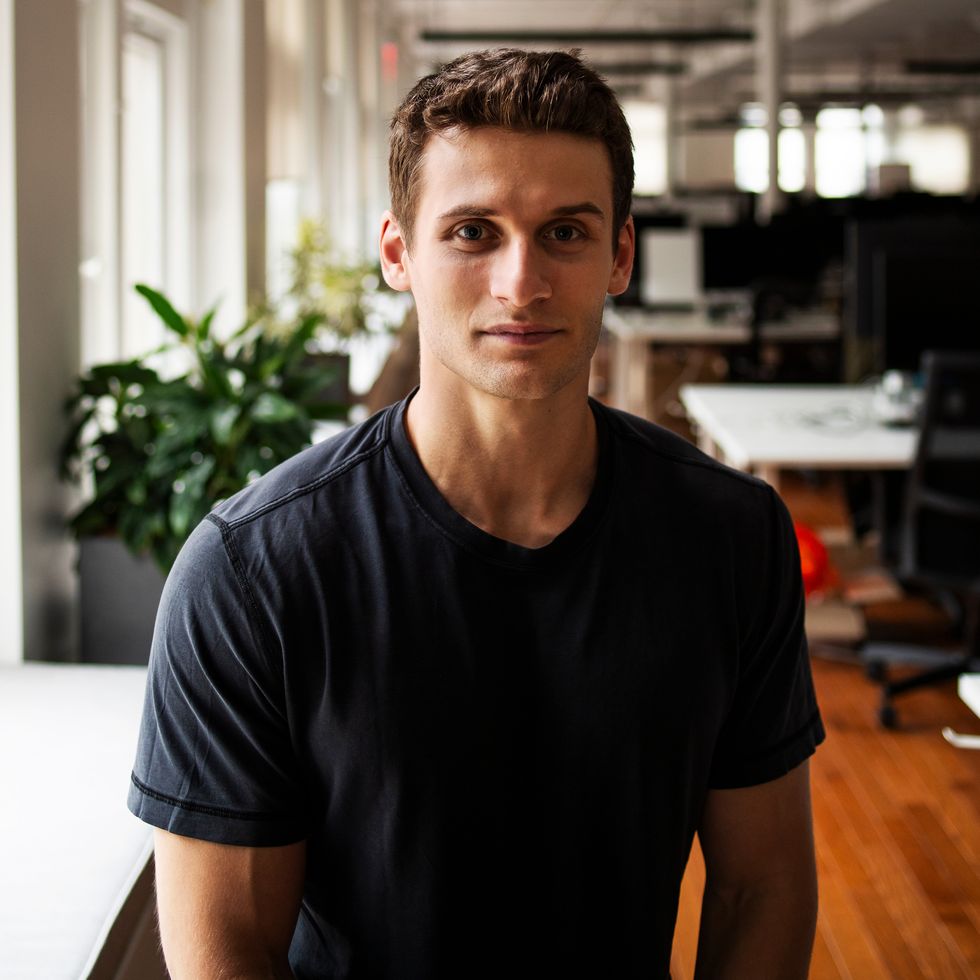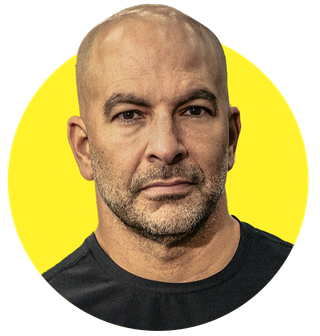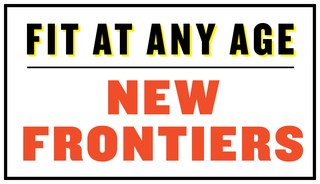
This story is part of Fit at Any Age: New Frontiers—a next-level guide to the latest science and tips for a stronger, longer life.
QUARTER-LIFE CRISIS? Never heard of it. Here, six guys who accomplished some amazing #lifegoals before turning 30 open up about how they did it, where they go from here, and what the rest of us can learn from them.
Jamal Hill
29, Paralympic Medalist and Founder of the Swim Up Hill Foundation
At six years old, Jamal Hill joined his first swim team. At ten, he was diagnosed with a hereditary neurological disease called Charcot-Marie-Tooth that took him out of the pool and into a hospital bed, mostly paralyzed from the neck down. Through physical therapy, he regained some movement, though he retained only about 30 percent of his nerve capacity from his elbows to his fingertips. This meant he had to relearn how to walk, hold a pencil, and, eventually, swim.
A little over a decade later, Hill would become a professional swimmer. In 2019, he joined a Pan-American team and won his first international medal at 24 years old. In 2021, he made the U.S. Paralympic swimming team, was signed by Speedo, and won a bronze medal. Once his dream of becoming a professional swimmer was realized, Hill made a pledge to be more than an athlete, which led him to create the Swim Up Hill Foundation, an organization that provides swim instruction to people of color throughout the world, many of whom don’t know how to swim. Hill refers to the foundation as his “most valuable asset” and most significant accomplishment to date.
I DON’T CALL the Swim Up Hill Foundation a not-for-profit—I call it a for-purpose business. The key things that make our foundation successful: Number one is me. I got a crazy work ethic. I’m extremely ambitious. I’ve always been a hustler. You got to have that committedness, that “I don’t want to quit” factor. You got to be very clear on your “why,” because it’s not worth it until it’s worth it. Most people nowadays fantasize about working for themselves but don’t have anything that truly sets them apart. Being a gold medalist alone is not going to set you apart.
Number two, you need to have a minimal viable product, MVP, that adds something different to the marketplace. It’s got to be special. Number three is your strategy. Businesses must earn a profit to be viable. What’s going to set you apart is your ability to generate your own revenue, and things like that take time.
If you do receive money [for your organization], whatever you do, do not spend the money that you get on things that you were already doing for free. That’s the biggest mistake. Somebody gets a grant for $10,000 and they were visiting schools; they then spend $10,000 to go and visit more schools. No, you were already doing that. This ist he money you need to be investing in your organization to create a structure and a viable product that will ultimately generate revenue and allow you to have self-sustaining ability, so that your mission can grow over time.
Number four: The biggest thing is always going to be mentors. I’ve had mentors this whole way, for better or for worse. Number five: You got to have a big fucking goal. With the Swim Up Hill Foundation, what drives our mission and what I sell people with is “We’re going to be teaching a million people how to swim every single year. I promise you that drowning will [come to] an end.” But for myself, that million is not big enough. I want a Nobel Peace Prize from work even beyond the Swim Up Hill Foundation. Hopefully one day this is so big, nobody knows who the fuck I am, but I’ll have such a breadth and wealth of work that the world has benefited multiple times over.
Danny and Michael Philippou
31, Directors of Talk to Me (2023)
Danny and Michael Philippou launched their YouTube channel RackaRacka in 2013 as a place to publish vlogs, horror comedy shorts, and “fake fail” videos, but the Australian twin brothers never wanted to be YouTubers. They wanted to be filmmakers. Enter Talk to Me, a 2023 supernatural horror movie about a group of teens who play around with an embalmed severed hand to talk to spirits. It received rave reviews, grossing $92 million globally and becoming distributor A24’s second-highest-earning film, with a sequel already in development. The YouTube stars turned filmmakers share the method behind their moviemaking success.
THE DECADE WE created videos on YouTube helped us grow as filmmakers. Every video we did we treated as a testing ground. We practiced different elements, whether creating our own visual effects, building a set, or doing makeup. That separated us from most debut feature filmmakers.
We wrote Talk to Me while still making YouTube videos. In 2018, we moved out to L.A. to try and sell the script. We were shopping it around everywhere and not getting any bites. We were aware there were doubts that YouTubers could direct a feature film, but the way we got around it was by [making the film first] instead of trying to get it sold beforehand. The A24 deal happened because they saw the finished film that we made independently premiere at Sundance.
For anyone trying to get a film picked up or a film made, the first step is to find a producer that knows the financing steps a bit better than you and can help you develop your script. It didn’t really take much convincing for our producer to take us seriously, because she saw in our YouTube shorts that we could tap into an audience, there was a narrative behind [the videos], and we were demonstrating editing and directing abilities.
In regards to the success of the film, it’s important to be really personal. Originally, one of the initial studios we spoke to was worried that Australian films don’t translate overseas. We found that humanity translates all over the world.
Successful filmmaking also requires hiring people and heads of departments that can accomplish things that you never can accomplish on your own. It’s about not being too dictatorial but allowing other voices to come in and help make your voice louder.
A lot of people are trying to wait for the perfect time for them to be ready to make something or create an idea. No, make the version that you can make now, and then the more you do it, the better you’re going to get. Get it out of your head and onto a page. Just start creating.
Andy Fang
31, Cofounder and Head of Consumer Engineering at DoorDash
Andy Fang is one of the four young people who founded DoorDash in 2013. The online food ordering and delivery platform, which began as a class project in the Startup Garage course at the Stanford Graduate School of Business, has grown into a $40 billion company and expanded to include grocery and beauty retailers. Fang, currently the head of consumer engineering, credits three key initial lessons for DoorDash’s success today.
FIRST AND FOREMOST, we made a point to focus our business philosophy on being customer obsessed, not competitor focused. Our early success was built on the fact that we did a lot to show our customers that we were committed to addressing their needs, and that helped build trust, which helped build our business.
The second most important thing we learned was how to thoughtfully run a strong, capital-efficient business. We showed investors business metrics like order frequency, share of new users, and consumer retention, which were outperforming projections. When you’re doing well in those areas, you can spend less on marketing and invest more in creating better products for the Dashers, merchants, and consumers.
Our entry into the Y Combinator [a well-known accelerator program for start-ups], which we went through the summer after my junior year of college, became our initial major fundraising challenge. The incubator investments we received were around $100,000. A month or so after the Y Combinator, we went through a successful round of Series A funding [the first round of funding after seed capital—the initial amount of money used to start a business]. From there we were finally able to pay ourselves a salary.
The third lesson we learned was how to get along as a group. Starting a business with another person always poses its challenges, but when you’re starting a business with friends, it can be even more difficult. We avoided any major conflicts among ourselves because we had a clear delineation of roles from the beginning. These roles always came naturally because they played into our strengths.
I was always the developer, building our software platforms and algorithms from the ground up. Stanley [Tang] had a strong talent for design and product; he designed all the user experiences and our marketing materials, while also defining the product vision to build a logistics network as our core building block. Tony [Xu] was always the most business-minded of the three of us—the best at talking to investors, defining the business model, and helping us sign our first merchant partners. [Editor’s note: Evan Moore, the fourth cofounder, left the company early on, before the Series A funding.]
At this point in my career, one piece of advice that has always stuck with me is to not force anything. If you force yourself to start a company, you can lose the love, the inspiration, and the magic that leads to innovation and creativity. Follow your curiosity. Take what you’re good at and find an intersection with something you enjoy doing.
Zach Reitano
32, CEO and Cofounder of Ro
At 18 years old, Zach Reitano was diagnosed with a congenital heart condition after his heart rate dropped to zero during a stress test. (His father, who’s a doctor, helped revive him along with a cardiologist.) After a heart procedure, the cardiologist prescribed Reitano a heart medication, but it had one main side effect: erectile dysfunction. When Reitano experienced heart issues again in his mid-20s and was prescribed the same medication, he feared it would derail his relationship with his then girlfriend (now wife). While the situation was less than ideal, it did inspire him to launch Ro (formerly known as Roman) in 2017. A telehealth company aimed at treating erectile dysfunction, it has since expanded into hair loss, weight loss, skin care, fertility, and more. As a cofounder and the brand’s CEO, Reitano has learned essential lessons while growing Ro into a $7 billion juggernaut.
WHILE LEADING RO, I’ve learned that receptivity to feedback and making yourself open to feedback is important. Feedback is data, and the main person that’s harmed by not getting that data is you. Check your ego at the door. This is a muscle I’ve built over time; it doesn’t happen right away. The greatest leadership gift [for me] is the humbling nature of running a company and [seeing] how often you’re wrong. It makes you far more open to everything in your life—every perspective, every opinion, every data point.
The other big thing for me is sustained work ethic. You do need to work harder than most people to have an impact. But to do that, you must prioritize your physical and mental health. I exercise three to four times per week. I have an executive coach that provides one-on-one guidance and support to help with the mental component. I have also benefited tremendously from a successful and supportive and deep relationship with my wife as a partner in life. We have date night every Saturday night, where I put away my phone. Having a community or support system, whether it’s a partner, friends, or family, is essential to sustaining that work ethic.
Speed of execution is a big thing, too. If you think about the way that people are taught in school, they’re generally graded as an individual on a percentage of what they get right—for example, 95 out of 100 on a test. When you get out into the real world and you build products, you’re not an individual; you’re a team. You’re also far more judged on the cumulative number of right answers than the percentage. That shift means you need to make decisions quickly with less data and still be right a lot. Learning that and being good at that is very important.
In my mind, there’s no secret to finding a product market fit and scaling up. There are ways to increase your chances, though: You move quickly, you do it without an ego, and you work really hard with integrity. The individuals and the skill sets may evolve over time, but if people keep that at the heart, ultimately that’s what will allow them to grow as an individual and build the best products for their customers over time.
Representative Maxwell Frost
27, First Gen Z Member of Congress
When Maxwell Frost’s friends first asked him to consider running for office in early 2021, it was a “hell no” from the then-24-year-old national organizing director at March for Our Lives (MFOL), a youth-led movement to eliminate gun violence. It wasn’t until he connected with his biological mother and learned about her life struggles that he finally told himself, I’m going to do this. He submitted his notice to MFOL in July 2021and announced his candidacy a month later.
Running a campaign is tough as hell. Following ten-hour days raising money and canvassing, Frost worked as an Uber driver and a backstage production tech at night to pay his bills. His mental health tanked. After making his way from 5 percent to 34 percent in the polls, he won the race to represent Florida’s 10th District in November 2022 and officially became the first Gen Z member of Congress. The year and a half of campaigning taught him many lessons, including how to connect with donors and really get people to support his vision.
I COME FROM an organizing background, so my adult life has really been all about knocking on doors, connecting with people, and trying to inspire people to be a part of something bigger than themselves. I got to use those skills to get people to buy into being a part of what we were creating—a campaign to elect me to represent us here in our home [of Orlando], which is a great honor.
The money is a huge part of [the success of a campaign], which is unfortunate. I think it’s a detriment to democracy, and we have a lot of work to do there. But I knew that to be a voice for changing the system from the inside, I would have to essentially play the game of raising a lot of money.
To do that, I needed to build those relationships over the phone and target those calls. The key is to find ways you can really connect with the individual who’s on the other side of the line. I always start my conversations by introducing myself and then asking them, “What do you care about? What are the issues that are top of mind for you right now?” Then it gives you an opportunity to really build rapport. After you build a rapport, you’re essentially working to set an environment where the person feels comfortable enough to write you a check at the end of that conversation. I start that part of it by preemptively talking about what the money’s going to be used for, then I ask them to give an exact amount. Don’t just say, “Hey, can you send a contribution?” We look at the donor’s giving history and we’re able to assess what a good and reasonable yet aspirational ask would be.
I would talk a lot about my age and the significance that played on donor calls,but I was very specific with my staff that I’m not running to be the first Gen Z member of Congress, so I would never bring it up during a debate. All my communication was: “Vote for me because I’ve been fighting as an organizer and I want to end gun violence and I want to defeat the climate crisis and I believe everyone deserves health care.”
The other thing is just knowing that it’s a campaign, and what you’re ultimately trying to do is get votes. The best thing you can do [to persuade someone to agree with you on a specific topic] is listen and validate the root of their concern. But don’t have it in your mind that at the end of the conversation, the person’s going to agree with you. More often than not, they won’t. You have to see yourself as a part of a bigger puzzle—not the end-all-be-all in the conversation.
Dr. Attia’s Longevity Tips for Your 20s & 30s
BODY • Your endurance-peak plateau extends through this time, so train for a marathon or century ride or triathlon and look to push your cardio fitness to super-high levels.
MIND • Life is happening—career, family, mortgage—so keep your stress-tolerance window open as wide as possible. Things that widen it are what you’d expect: exercise, sleep, time with friends, and other behaviors that support emotional health. Overcommitting compresses that window; work on learning to use the word no.
This article originally appears in the March/April 2024 issue of Men’s Health.
Want more longevity tips? Click the link below to read all of the stories.
 Print
Print
